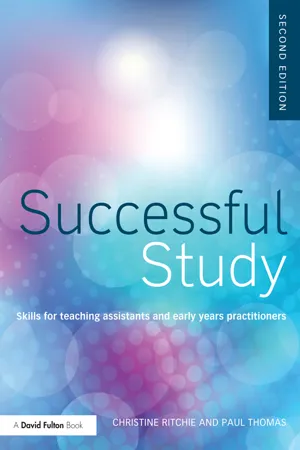
Successful Study
Skills for teaching assistants and early years practitioners
- 170 pages
- English
- ePUB (mobile friendly)
- Available on iOS & Android
Successful Study
Skills for teaching assistants and early years practitioners
About This Book
Successful Study is an essential guide for students embarking upon an education related Foundation Degree without previous study experience.
The world of study at university can be a daunting and bewildering place for new students unfamiliar with the academic processes such as writing essays and presenting portfolios. This book offers clear and straight-forward explanations of how to prepare for study, how to work at higher education level and how to tackle assignments.
Covering all aspects of educational study, and based on the experiences of real education professionals, this new edition has been fully updated to include:
-
- Clear links to work-based practices throughout
-
- Advice for students with disability
-
- Guidance on using e-resources
-
- Tips for managing your learning and increasing motivation
-
- How to think critically
-
- Reflective practice
With case studies, tasks and opportunities for reflection, this accessible book has been specifically designed for those on Teaching Assistant, Early Years or related Foundation Degrees and will be an essential resource for those wanting to find the answers to study questions quickly and easily.
Frequently asked questions
Information
1 | Starting study: getting organised |
knowledge: what you know and have learned about your work through experience | |
skill: how well you can do things | |
understanding: an awareness of interrelationships. |
Statement | Yes | No |
I understand the requirements of my current job and am efficient and effective in that role. | ||
I work well with other adults in the workplace, and contribute ideas that help towards ensuring the smooth running of the curriculum/environment. | ||
I am a good communicator – I listen well to others, and am able to explain tasks and ide... |
Table of contents
- Cover
- Half Title
- Title Page
- Copyright Page
- Table of Contents
- Acknowledgements
- Introduction: what to expect at higher levels of study
- Chapter 1. Starting study: getting organised
- Chapter 2. Reading for study
- Chapter 3. Note taking
- Chapter 4. Writing academically
- Chapter 5. Planning and writing essay-type assignments
- Chapter 6. Further writing: reports and case studies
- Chapter 7. Portfolios and other assignments
- Chapter 8. Challenges: examinations and searching for resources
- Chapter 9. Reflection, reassurance and relaxation!
- Index
